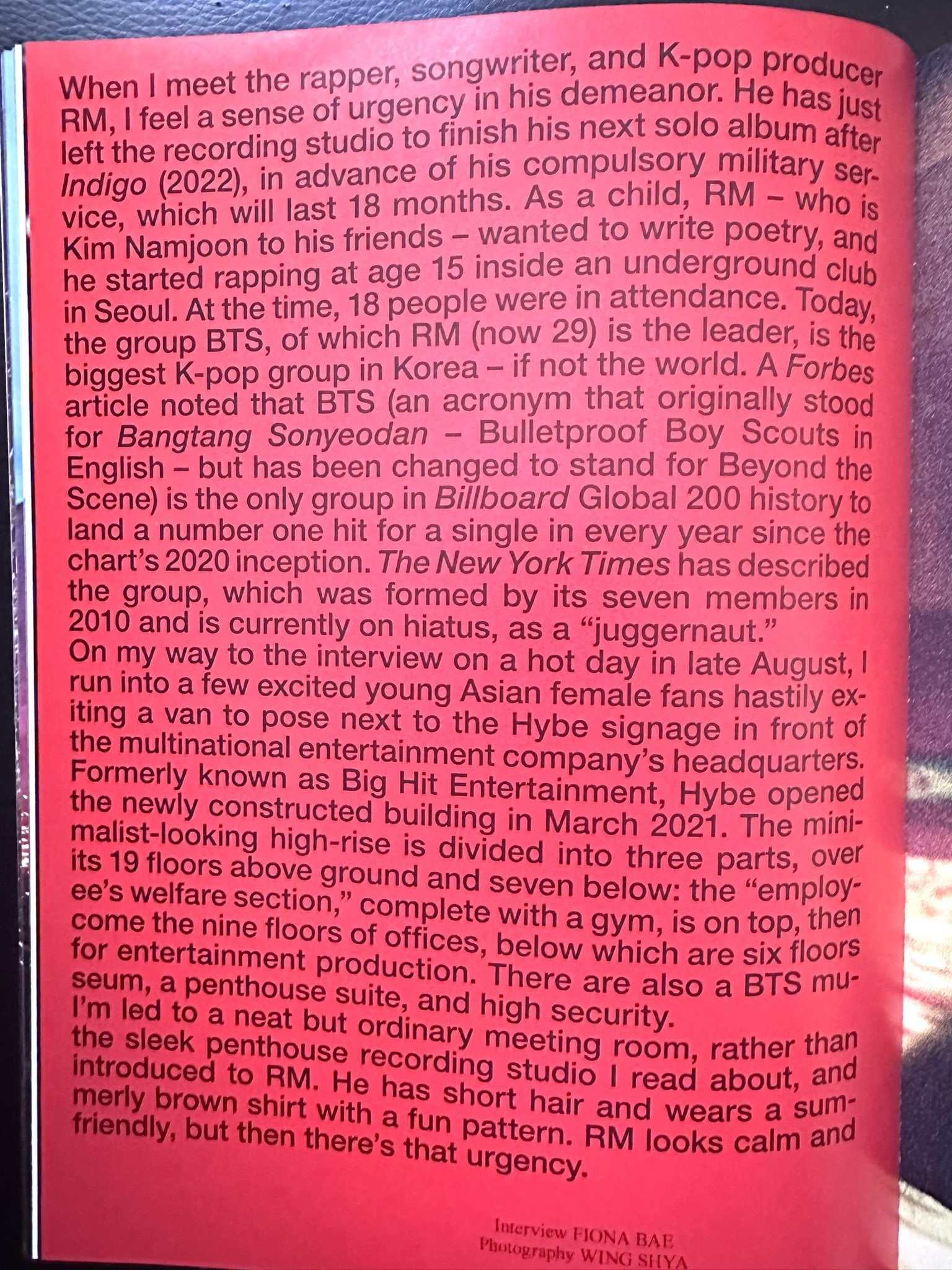
ARMY shared images of [the magazine interview](https://x.com/jungkkyu/status/1728044109644853384?s=20), going to transcribe them here.
Q: Your last solo album, Indigo, cen- tered on your search for identity. How have you evolved in the …. eight months following its launch?
>There’s been so much going on, personally and professionally, I’ve been broken and then put back together so many times. I realized that the person I think I am doesn’t really exist.
Q: What can you tell us about the next project you’re working on?
>Largely, it is going in the opposite direction of Indigo, but it’s not just lighthearted and fun. When people see me, they think I’m a very serious, gentle, and nice person, but I’m not just that. There are many aspects of me that aren’t so serious. I also like making people laugh.
Q: How do you define yourself?
>That’s a good question. I’m not a narcissistic person, and I’ve always been driven by my own insecurity I’m a person who has so much dirt, filth, love, kindness, and consideration in me that I feel I would go insane if I didn’t bring it out candidly, into the world, in some way. And I’m a person who wants to change something, whether it’s myself, people around me, the industry, or the world. I feel like I’m born to transform something, and I think I’ve done it once with BTS.
Q: You sound like you have a mission and calling.
>Some people question why I do it, but at the end of the day, if you don’t wear the crown, you don’t understand, It’s not a crown that I asked for, but I try to stay positive and use my influence. What I should do is to take the most beautiful thing about my art and turn my personal individuality into universality. It’s so beautiful to see people laughing and crying because artists made their stories universal and cosmic. When I went to the concert of Kim Yuna, the leader of the band Jaurim, 1 heard a fan screaming in tears, “I didn’t kill myself because of you!” I have received positive messages about how people had benefited from my music before. but hearing this right next to me was profound. I realized that music can really save people. That’s what 1 want to do. I could not survive in BTS without that calling. If I didn’t have a calling. I’d die.
Q: How do you deal with your place as a superstar?
>I learned metacognition early. I try to see messages popping up in the distance. I built the muscle to juggle between the stress of always being on view and the benefits of becoming super-famous. The other day, I happened to see the four habits of happy people on Instagram. I really hate that kind of self-help stuff. But then I realized that I was saying all the four phrases mentioned there. Perhaps I am happy. I also try to let stuff out, and I’m getting better al 1, but the hardest part is the K-pop industry’s atmosphere. It’s kind of sad to admit this, but people are so conscious of others, and many see only what they want. But I’ve done this for 10-11 years now. I think it’s the right direction to move, where people like me. with some power. are a bit more honest. It’s a time when more honesty is celebrated.
Q: How are you revealing yourself?
>The best way is obviously through an album or content. I also try to share my life more on Instagram. I’m showing a kind of vulnerability. I get attacked because some people react that it’s too much for an idol to show. But for me, it is a way of saying “I love you” to people. How long can I just keep my mouth shut and only talk about good stuff in interviews? If you keep pressing it, it’s bound to burst. I’m not exactly saying I was living a lie for the last ten years. It’s just that I lived so intensely that there was little time to consider anything other than what I should do immediately next.
Q: How did growing up in Korea affect you?
>I grew up in a new town called Ilsan, next to Seoul. After spending much time abroad, I realized my roots are what sustain me. Your childhood has a strong hold on you. You either emulate it or bounce back from it in the opposite way. I had quite a happy childhood. I was loved, and some of my best friends are people I met then. The affection, nostalgia, and longing I have for Korea is essential to me. K-pop is immensely intense and dynamic because it’s K and pop combined. People are responding to that quantum accelerator, to that energy, to that fusion. I am like a salmon coming back to the stream. It’s my way to live in the K-pop world and not go crazy
Q: What do you think about the K-label? I personally think the Korean government and the domestic press seem rather obsessed with it, because they are so proud of what our small country squeezed between Japan and China has achieved.
>It is also driven from the outside. To understand the unfamiliar, you want to frame it in a certain way. It’s a human instinct. People want to think there is something in this country where K-pop and other cultures are rising. But I’m not negative about this label. I’m so grateful that they’re trying to name something Korean. It’s understandable that many creators are uncomfortable with being framed. It’s now up to each artist to individualize their identity. And such individualization is enabled, thanks to a K- label.
Q: K-pop mixes many different genres. Do you feel it has developed a sonic signifier?
>Yes, certainly. It has gained quite a strong sonic signifier, and many countries are trying to copy it. I didn’t join BTS because I wanted to do K-pop. BTS was originally more of a hip-hop band, like Run-DMC or the Beastie Boys, but we somehow got to where we are now. I want people to look at K-pop in a more three-dimensional way. TO start with, it’s basically dance music. But k-pop is not just the music, it’s the choreography, it’s the music videos, and the ancillary content that goes along with it. It’s this huge package. I’ve seen a lot of people with negative views on k-pop eventually turn into fans after digging into it. So I want to tell people, “Don’t knock k-pop until you try it!”.
Q: I feel that by breaking out of traditionally oppressive social constraints in Korea, many artists have attained bold and brave attitudes that resonate with young people in other countries who want to defy old orders.
>While some artists might feel that way, I don’t think it was necessarily my case. It wasn’t like. “I like chanting freedom and love through hip-hop because my life is so tough” or “I love the resistance ethos of hip-hop.” Instead, I just found it fun.
Q: People want to figure out if there is a certain character or trait in Korean culture that brought global fascination. Is there?
>I’ve been in the eye of this storm [of K-pop and Korean culture’s success], and I’ve probably done more interviews like this one than anybody else. The closest answer to my heart is, “I don’t know, so probably nobody else knows, either.” If I said I knew, it’s like explaining why I love a person at some specific moment. I’m so Korean that if someone from the outside asks me what Korean is. I don’t really know how to say it. There’s definitely a certain mood we cannot deny.
Q: What about fashion in general? Bottega Veneta recognized your cultural influence and made you their only global ambassador.
>I wasn’t keen on being an ambassador for luxury brands. But Bottega’s creative director, Matthieu Blazy, explained that he chose me because he liked my lifestyle and art on my Instagram. He said, “Let’s just be friends and talk about those things.” I found it refreshing, so I said yes. Fashion is one of the very entrancing pieces of content in my life. I used to be obsessed with fashion, when I started in music, and I still like it. There was a time when I was wearing streetwear, gothic, Rick Owens, or Damir Doma. I thought it was so cool to wear all black. Then I felt like I needed some color, just like how I moved from my album Mono (2018) to Indigo (2022). With my job, I’m constantly being seen. There’s this thing called airport fashion. People expect me to always wear something new. So, I wanted something timeless, things that are from 2015 that I can wear in 2023. I looked for something classic and comfortable without going out of style and settled on American Casual. That was almost six years ago. Now, I want to try out wearing things that are a little kitschy, a bit out there, unusual, and uncanny. Fashion is kind of a Kakaotalk [Korean equivalent to WhatsApp] status message. It’s the most “스근 [seu-geun, smooth, gentle, subtle, and unforced]” way of saying how I feel and how I want to express myself today. It’s one of the most passive and active ways of expressing myself.
Q: I’d like to talk about the rise of contemporary Korean culture with you, since you’re the apogee of Korean pop culture. Through interviewing artists for my book, I came to believe that a bold and brave attitude pioneered by young Koreans, remixing everything with zero inhibition, made Korean culture influential globally. Do you think there is any Korean attitude or approach which contributed to its success?
>The only part of Korean culture I understand is probably music. I can’t represent other parts of Korean culture. And I think there’s a lot of prejudice about Korea from others, such as the idea that we’re too hard-working. But we shouldn’t judge other cultures through our lenses. It would be wonderful if we could look at a person, a country, and a culture in a transparent way.
Q: Frieze Seoul’s arrival last year elevated Korea’s status by proving that it wasn’t only K-pop or K- drama but also Korean art scenes that attracted global attention. And your visit to the fair created more buzz than any press. I know you started collecting art in 2018, but I was amazed when Thaddaeus Ropac told me about the great in- fluence you have on young collectors. He said young Korean collectors like you espoused a knowledge and passion across a variety of artists and periods, and he had never seen it in other countries. Why do you collect art?
>While touring the world, I began to appreciate visiting museums and looking at the paintings I learned about in school textbooks. But it dawned on me that, while I knew Monet and van Gogh, I knew nothing about Korean artists. I now love Korean modern and contemporary art. They were squeezing paint on a palette when they went through the Japanese occupation and the Korean War. It’s comforting to know the hardships and the struggles that I go through are nothing compared to theirs. For them, it was a matter of life and death. But there are also things people misunderstand about me. For instance, I actually don’t like everyone in Dansaekhwa [the monochrome painting movement formed in Korea during the 1950s amid efforts to reconcile the influence of Western modernism on Korean artistic culture]. Yun Hyong-keun is the only one I admire. I don’t think you can frame or tie them together. In that sense, Dansaekhwa is like K or K-pop. I went to meet all the old gallery owners and late artists’ families
by HiThereImNewHere


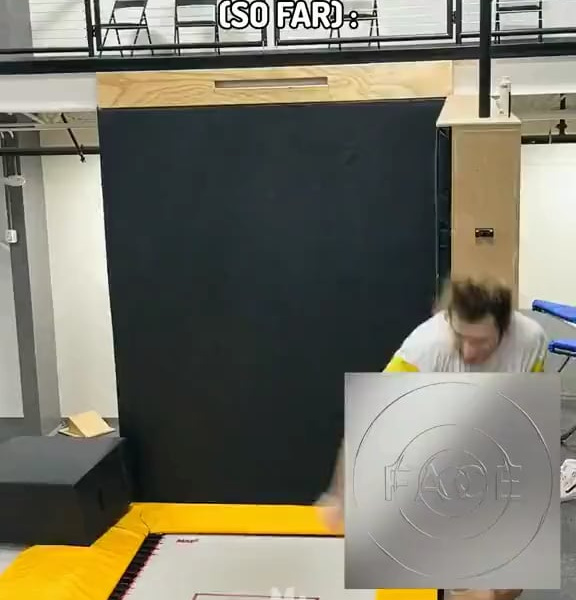
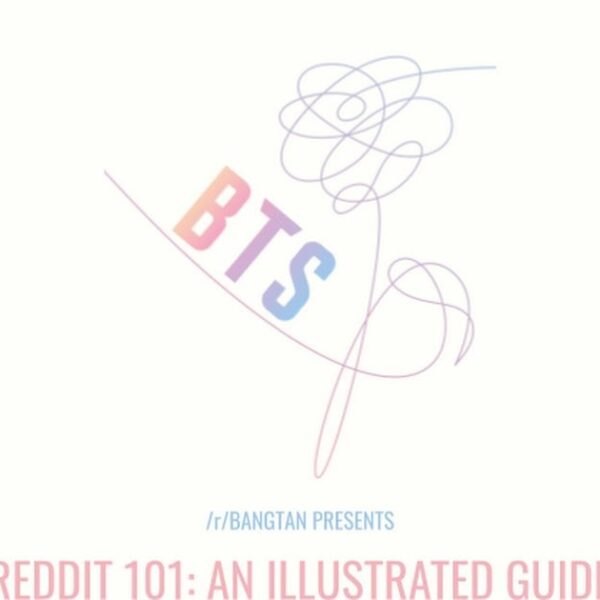
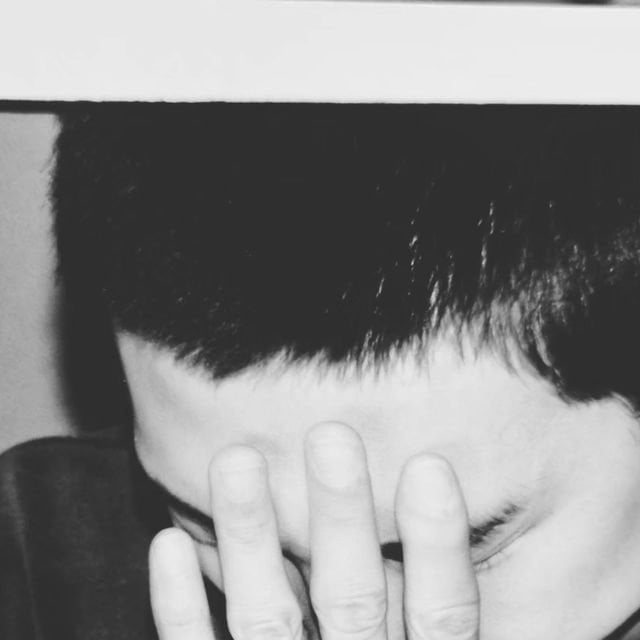
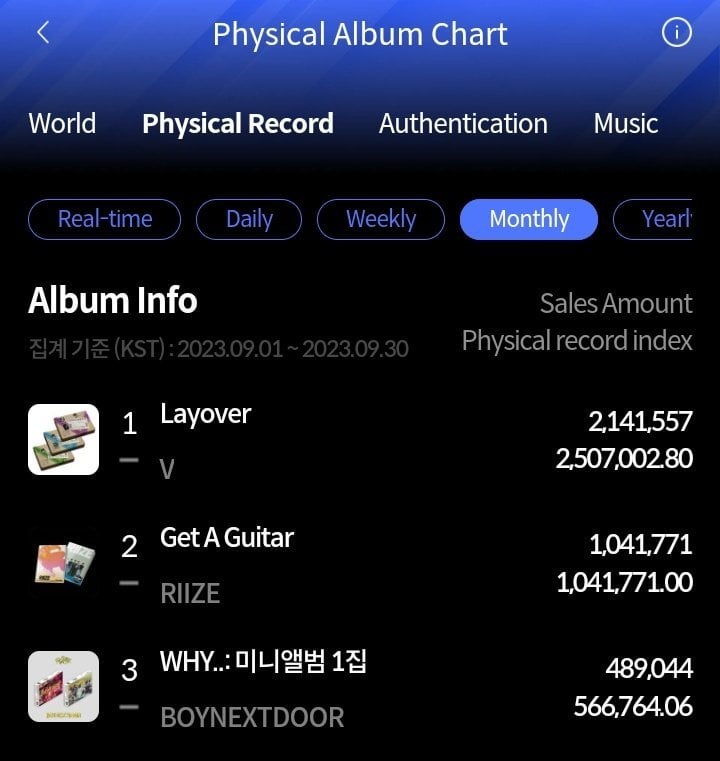
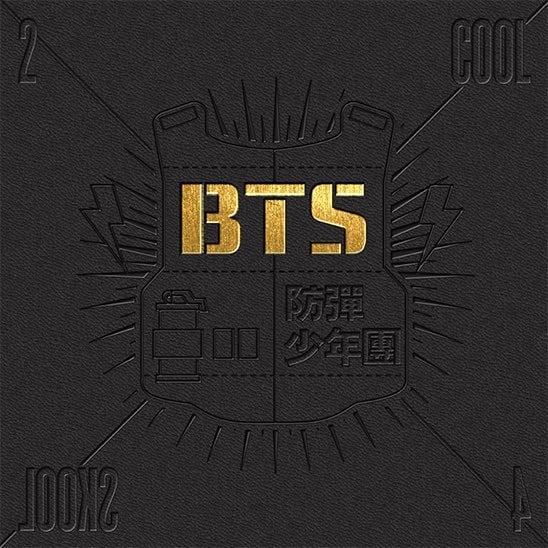
After the mess that was today, this interview would shut all haters’ mouths if they bothered to read & understand it.
But we all they won’t….so
What I find particularly interesting is that he’s just such an honest man, he really just tries to live his life the best way he can. I think that’s a virtue, he’s done with hypocrisy and all that bs.
“I don’t know, so probably nobody else knows either.” —that is some humble king shit